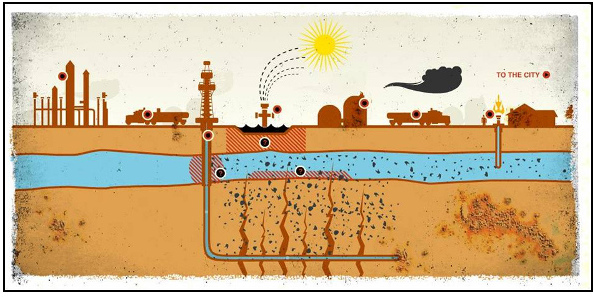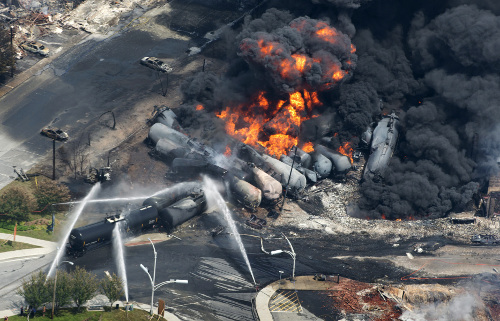On the First Anniversary of Disaster at Lac-Mégantic, Canada
August 4, 2014 | Revolution Newspaper | revcom.us
From a Reader:
One year ago, on July 6, 2013, a train derailed in the small town of Lac-Mégantic in Quebec, Canada. The 73-car train exploded in the center of town, creating an inferno of fire and smoke, and hazardous chemicals that devastated the town, killing 47 people and destroying over 40 buildings. This was briefly reported as a horrible accident in the media, but quickly the story disappeared from the U.S. news.
At Revolution Books in Chicago, a student of fire and safety presented a slide show about this disaster, and what she brought out demonstrated that this “accident” was brought on by the workings of capitalism in the all-out search for profit by expanding the extraction of oil and gas. The substance being carried on the train cars that exploded in Lac-Mégantic was a special type of crude oil, called “Bakken” after the shale deposit in North Dakota where it is extracted by the process called “fracking.” Bakken oil is much more volatile than even regular crude oil, with an ignition temperature of just 68 degrees F, meaning that once ignited, it can sustain and generate explosions at that temperature, making it highly volatile. It also burns hotter than regular crude oil, being loaded with highly flammable hydrogen sulfide and other chemicals used in fracking.
Fracking, an environmental nightmare, involves drilling into the shale and pumping a mix of water, sand, and chemicals (including methane and propane) that spreads for miles underground, forcing the gas and oil up a well through fissures in the rock, where it is collected, put into trains, and sent off through cities and small towns, through farmlands, forests and wild lands, to refineries thousands of miles away. The use of rail transport by the oil industry has increased dramatically in the last five years, with McNish & Robertson (2014) citing an increase from just 8,000 cars in 2009 to 400,000 in 2013.
The train that exploded in Lac-Mégantic had left North Dakota on the morning of July 5, 2013. The speaker explained that the train was operated by a single engineer—who was the only human being on this train. When he reached the town of Nantes, about 4 miles uphill from Lac-Mégantic, the engineer found an unguarded train yard nearby to park the 73 cars behind the engine, set the brakes, and left the train to go to a hotel to sleep. No, it was not negligence, or in violation of regulations: this was standard operating procedure for these kinds of transports. This is a change from the previous Standard Operating Procedure; years ago, there would have been at least 2 people on the train, and it would not have been left unaccompanied. But with the general trend toward cutting back on regulations and the U.S. relying more and more on fracking to maintain its energy dominance world-wide, the mad rush to extract more has meant changes in the systems used to transport it, to increase all-round profitability.
The speaker described how later that night in July, sparks ignited on the first car. It didn’t explode, and someone driving by called the fire department, which put out the small fire, and turned the train off in order to prevent further sparks. Everyone then went back to bed; no one truly understood what those cars contained (Bakken oil) or the immense danger of explosion. A short while later, with the air brakes turned off, the hand brakes on the train failed, and the unattended train began to roll, downhill, toward Lac-Mégantic. By the time it reached the curve in the middle of town, it was going 63 mph. There it derailed and detonated, with the resulting explosion killing 47 people in the town center and the sonic blast blowing down 40 buildings.

Above: A diagram of the fracking process.
Photo: flickr Creative Commons/gaslandthemovie.com
The oil- and chemical-fed fire was too hot to extinguish, comparable to lava flowing from an erupting volcano, and it was several days before it burned itself out. The volunteer fire department in this small rural town was never alerted that this type of material would travel through their area and had no adequate resources to fight it. Not even larger Quebec City could assist them in dealing with the disaster, all of which illustrates why trains carrying Bakken oil are commonly referred to as “bomb trains.”
In addition to the 47 people killed and the 40 buildings destroyed, there was even more environmental damage. The “Lac” in Lac-Mégantic means “lake” in French and refers to the beautiful lake the town borders. That lake is now heavily polluted from whatever of the Bakken oil did not burn in the town center.
The fire safety speaker brought out another reason this disaster was so severe, linked to the driving force of anarchy as capitalist corporations seek ever more profitable methods of transporting crude oil. The cars on this train were “DOT-111” cars, the rail industry’s standard train cars that are easily more than twenty years old and not manufactured to carry the volatile Bakken oil and associated fracking chemicals. There are no regulations prohibiting the use of DOT-111 cars; whatever cars are in the train yard are used, even if they do not have the features required to safely transport this kind of hazardous material. This is the way the transport industry is set up—to run at a frantic pace, with as little cost as possible.
Are the capitalist companies concerned about this now? After the disaster at Lac-Mégantic did they pull all the DOT-111 cars out of their fleets and use the newer train cars that have been developed with safety features to reduce the risk of explosion in a derailment? No, according to USA Today (2014), DOT-111s currently comprise 228,000 of 335,000 cars in active use, with only about 18,000 train cars that meet the safety standards for transporting Bakken oil.
Just a few days ago—after this presentation at Revolution Books—the Department of Transportation issued proposals for new regulations that require retrofitting of the DOT-111 cars carrying this highly volatile Bakken crude and reduced travel speeds. However, the director of the Sierra Club called them “far too little, too late, and the process takes far too long.” The new rules will not be finalized until after a 60-day comment period, and typically that is followed by legal challenges. The president of the American Association of Railroads, however, called them “a much needed pathway for enhancing the safe movement of flammable liquids…” The capitalist class and the railroad industry in particular face a crisis. More disasters like Lac-Mégantic pose serious financial and even more serious political problems as opposition to tar sands and fossil fuels in general grows. And yet under capitalism, these DOT-111 cars must earn at least a going rate of return on the investment of capital they represent before they’re decommissioned, and slowing down the extraction of oil through fracking in the midst of the boom in North Dakota would be a serious brake on an important economic driver.
The discussion following the presentation, involving several people from the Chicago environmental movement, revolutionary communists, and other activists, started with the question of why the disaster at Lac-Mégnatic happened and quickly went to why capitalism has created an environmental emergency for the planet.
The speaker brought out how the disaster at Lac-Mégantic was just one example of how the whole planet is at risk, and that the way to stop the environmental emergency is through communist revolution, highlighting the Constitution for the New Socialist Republic in North America and the special issue of Revolution, “State of EMERGENCY! The Plunder of Our Planet, The Environmental Catastrophe & The Real Revolutionary Solution.” This is true because under socialism, there wouldn’t be a reliance on unsustainable energy sources, and “solutions” that destroy the environment on which life depends (like fracking) would not be implemented. This led to a lively exchange over problem/solution, with points made about the need to resist on the local level since these Bakken trains are believed to be routed around and through Chicago (a major rail hub), through the oppressed neighborhoods of Pilsen and Little Village, and there have been significant objections raised by suburbs such as Aurora, Illinois. Even all the firefighting personnel, technology, water, and stored fire-fighting foam available in Chicago, which can handle an airplane crash at O’Hare airport if necessary, would still not be able to handle a derailment and detonation of 72 cars full of Bakken oil, and these trains are allowed to pull as many as 120 cars, 40 percent longer than the train that incinerated Lac-Mégantic. Most rural towns these trains pass through would be completely at a loss to handle the devastation of derailed tanks cars carrying this fuel if they detonated in their area.
The discussion touched on the international dimensions of the environmental emergency, including the fact that 2015 is the 30th anniversary of the Union Carbide explosion in Bhopal, India. The discussion on communist revolution sharpened up the question of what it will take to stop capitalism and whether there is a social base for it in this country, bringing in lessons from the special issue of Revolution “State of EMERGENCY! The Plunder of Our Planet, The Environmental Catastrophe & The Real Revolutionary Solution” and the fundamental need for state power to be able to really address the root cause of tragedies such as the disaster at Lac Mégantic.
Finally, determination was expressed to make the protests at the UN Climate Summit 2014, which takes place in New York City this September 21, a powerful manifestation of our intent to STOP the destruction of the planet.
Volunteers Needed... for revcom.us and Revolution
If you like this article, subscribe, donate to and sustain Revolution newspaper.

